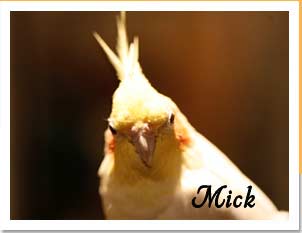Breeding Season – When Hormones Rule!
by Shauna HillFor many who have lived with parrot companions for a while, the coming spring season is looked to with the knowledge that this can bring about changes in their beloved bird.
For those new to living with a feathered family member it can be a surprise for which they are not prepared - especially if they have had their bird since it was a young chick who has always been sweet and, after reaching sexual maturity, has started to change. It can leave the human who loves their bird with hurt feelings and wondering why this change is taking place. So what are those potential changes and what can a human caregiver do to help everyone in the household to peacefully co-exist during this potentially challenging time?
Very simply, for many birds springtime is when hormone levels increase, resulting in the urge to mate, protect their territory or perceived nesting grounds (which can include dark secluded areas such as boxes, under furniture, closets, and paper bags). Any intrusion by those who the bird does not perceive to be their mate can be met with biting, flying at, or running after the “intruder”. This behavior can be directed towards other family members and other pets in the home. Males can be very protective during this time. Females may become protective too, or may become especially clingy and seek out nest sites, or pull feathers from the chest area where they would be laying on eggs to create a brood pouch. Some females may lay eggs without the presence of a male. It has been noted though that both sexes may try to set up a nest, chewing up furniture or other nest material. Some will hold their droppings, as in the wild they do not want to soil the nest site - so droppings may become large and may have a more diarrheic appearance. Keep in mind that in captivity we give them the ideal conditions for breeding – a warm home, plenty of food, and safety from predators. It’s no wonder they react instinctively.
Here are tactics which we as their caregivers can take to help ease the effects of this time of year:
- Avoid petting or stroking your bird’s body in areas that can be sexually stimulating such as the back, under the wings, or tail area.
- Starches and sugars can increase hormonal behavior, so carefully limit foods high in starch or sugar such as grapes and corn.
- Be careful with visitors or other family members when they hug or hold you while your bird is out. The bird may view you as their potential mate and your visitor as a rival, and may react in a protective manner (flying at or biting the rival, or biting you to get you to move away).
- Remove boxes or any potential nest sites from the cage or play area.
- Allow your bird to get plenty of rest. This may require covering their cage or closing curtains and blinds to darken the room for sleep.
- Adjusting the cage set up or moving the cage may distract from breeding behavior should your birds start getting into egg-laying mode or try to breed.
- Stick training can be very valuable at this time, when you may need to limit handling of your bird. It allows for safely moving the bird when necessary so you can avoid an unwanted bite.
- Please remember – hormones and breeding are a natural occurrence for birds and they are going on instinct, so do not take it personally if you do see these changes. It does not have anything to do with your bird liking or disliking you.
Note that not all birds display extreme behavior changes during breeding season. For other suggestions, or answers to questions regarding breeding behavior issues or egg laying, speak with your avian veterinarian.

